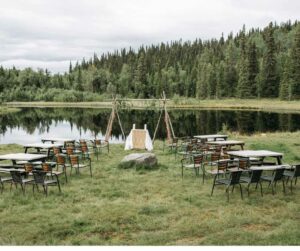The Destination Wedding Planner’s Handbook: Everything You Need to Know to Plan Your Dream Wedding

Planning a wedding is an exhilarating experience, but when creating an unforgettable affair, a destination wedding adds an extra touch of magic. Picture saying “I do” against a backdrop of stunning beaches, majestic mountains, or historical landmarks. However, pulling off a flawless destination wedding requires careful planning and consideration.
According to recent statistics, destination weddings are gaining immense popularity among couples. In fact, according to statistics, approximately 25% of weddings are now destination weddings. This rising trend is unsurprising, given the allure of a unique and personalised experience. Destination weddings allow couples to combine their love for travel and their special day, creating memories that last a lifetime.
This blog will delve deeper into the various considerations for a flawless destination wedding.
From selecting the ideal location, finding reputable vendors, managing logistics, and incorporating cultural elements, we will provide valuable tips and tricks to make your dream destination wedding an unforgettable celebration of love.
So, get ready to embark on an exciting journey that will turn your wedding fantasies into a breathtaking reality.
Importance of Careful Planning in Selecting a Wedding Venue
Careful planning plays a crucial role in selecting a wedding venue. The choice of venue sets the stage for the entire wedding experience and can significantly impact the mood and ambience of the event.
Here are some reasons why careful planning is essential in this process:
Availability and Booking
Popular wedding venues often get booked well in advance, sometimes even years ahead. Careful planning allows you to secure your desired venue by checking availability and making reservations early, and waiting until the last minute may result in limited options or the need to compromise on your preferences.
Accommodating Guest List
Another consideration is selecting a wedding venue that comfortably accommodates your guest list. By planning, you can estimate the number of guests and find a venue that suits your needs. This ensures that everyone can be accommodated and that there is ample space for dining, dancing, and other activities.
Budget Management
Planning in advance allows you to allocate your wedding budget effectively. Different venues come with different price tags, and careful consideration ensures you choose a venue that fits your budget. Additionally, you can negotiate prices, compare various options, and avoid unnecessary expenses or surprises later.
Desired Atmosphere and Theme
Your wedding venue sets the tone and atmosphere for your special day. By planning, you can select a venue that aligns with your envisioned theme. This helps create the desired ambience and enhances the overall experience for you and your guests.
Logistics and Convenience
Careful planning involves evaluating the logistical aspects of a venue. Consider location, accessibility, parking facilities, nearby accommodations for out-of-town guests, and any restrictions or regulations. Assessing these details beforehand ensures convenience for everyone involved and minimises potential challenges or surprises on the wedding day.
Factors to Consider When Selecting a Venue
When selecting a venue for any event, several factors should be considered to ensure the suitability and success of the occasion. Here are some key factors to keep in mind:
Capacity
Determine the number of guests you expect to invite and find a venue that can comfortably accommodate them. Consider factors like seating arrangements, dance floor space, and any additional areas you may need, such as a separate room for cocktail hour or a designated children’s area.
Location
The venue’s location is an important consideration. Evaluate its proximity to your ceremony location, the accessibility for your guests, and the availability of nearby accommodations. If you plan to have a destination wedding, ensure the location is suitable for travel and offers amenities and attractions for your guests.
Budget
Establish a budget for your wedding and allocate a portion of it to the venue. Understand the cost structure, including any rental fees, additional services, and possible hidden costs. Ensure the venue cost fits within your overall budget, allowing room for other essential elements like catering, decor, and entertainment.
Style and Atmosphere
Consider the desired ambience and style of your wedding. Whether you envision a formal affair, a rustic outdoor celebration, or an elegant ballroom event, the venue should align with your vision. Evaluate the architecture, interior design, and overall aesthetics of the space to ensure it matches your desired theme and enhances the atmosphere.
Amenities and Facilities
Assess the amenities and facilities offered by the venue. Consider aspects such as restroom facilities, dressing rooms for the wedding party, parking availability, wheelchair accessibility, and any additional services they provide. Some venues may also offer in-house catering, audio-visual equipment, or event coordination services, which can simplify the planning process.
Restrictions and Regulations
Inquire about any restrictions or regulations imposed by the venue. These could include noise restrictions, time limitations, limitations on decor or vendors, or specific requirements for alcohol service. Understanding these regulations beforehand will help you plan accordingly and avoid any surprises on your wedding day.
How To Achieve a Picture-Perfect Wedding Day
To ensure a smooth and successful wedding day, here are some essential tips to keep in mind:
Create a Detailed Timeline
Develop a comprehensive timeline that outlines the schedule of events for the entire day, including the ceremony, cocktail hour, reception, speeches, and other important moments. Share this timeline with your wedding party, vendors, and key individuals to ensure everyone is on the same page.
Hire a Wedding Coordinator or Day-of-Coordinator
Consider enlisting the help of a professional wedding coordinator or day-of coordinator who can oversee the logistics and execution of your wedding day. They will handle vendor coordination, timeline management, and troubleshooting any issues that may arise, allowing you to relax and enjoy the day.
Communicate with Vendors
Maintain clear and open communication with all your wedding vendors. Confirm details, arrival times, and specific requirements well in advance. Provide them with a contact person available on the wedding day to address any last-minute questions or concerns.
Delegate Responsibilities
Assign specific tasks to trusted individuals to assist you on the wedding day. This could include overseeing decorations, managing guest arrivals, coordinating with vendors, or handling any unexpected situations. Delegating responsibilities will help alleviate stress and allow you to focus on enjoying your day.
Conduct a Venue Walkthrough
Before the wedding day, visit the venue and conduct a walkthrough with your coordinator or venue manager. Familiarise yourself with the layout, discuss any specific requirements, and address any concerns or questions you may have. This will help ensure that everyone involved understands the logistics and can execute the plan smoothly.
Conclusion
Choosing the perfect destination, working with a wedding planner, effective communication with vendors and guests, setting a realistic budget, and embracing flexibility are key factors for success. Couples can confidently create lifelong memories in a stunning destination setting by being prepared for unexpected challenges and enjoying the journey.
Was this article helpful? Let us know in the comments!












